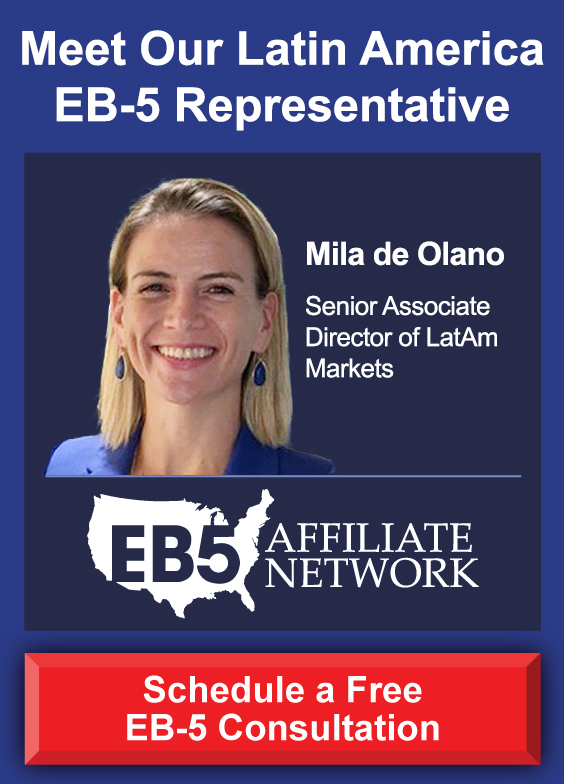
The appeal of using EB-5 investment financing as a main source of funding is clear in many industries, such as business and real estate development. This is mostly because of the attractive, often below-market interest rates it offers.
The EB-5 Regional Center Program has significantly contributed to the growth of the EB-5 investment industry. This program allows EB-5 visa applicants to invest their funds through entities known as regional centers, which then distribute this capital to their business or real estate projects.
After a temporary halt in 2022, the regional center program was reinstated on June 24, 2022, by a decision from a U.S. federal district court. Since the regional center option has typically been the preferred choice for EB-5 investors, there has been a consistent upsurge in new regional center projects. This has also translated into more applications for new regional center designations or purchases of existing ones.
In this article, we will cover every aspect of EB5 regional center acquisitions.
Characteristics of the EB-5 Regional Center Program
Benefits of Acquiring a Regional Center
Promoting Your Regional Center for Sale
Due Diligence When Buying a Regional Center
- The Importance of Thorough Due Diligence
- Inspecting the Records of the Regional Center
- Evaluating Documentation from USCIS
Navigating the Acquisition of Regional Centers
Seeking Professional Assistance with Regional Center Acquisitions
Characteristics of the EB-5 Regional Center Program

The regional center model for EB-5 investments pools funds from several investors, allowing for larger-scale projects and typically decreasing the immigration risk for foreign nationals. On the other hand, the direct EB-5 investment model is limited to a single EB-5 investor.
A distinctive advantage of EB-5 regional center projects is the recognition of indirect and induced job creation. For EB-5 visa eligibility, an investor needs to show their investment contributed to the creation of a minimum of 10 jobs in the U.S. While direct jobs created by an EB-5 investment must be maintained for no less than two years on a full-time basis, regional center projects can also include indirect and induced jobs generated through construction spending and operational revenue in their job creation count. This method allows for the job creation criteria to be met through the documentation of construction expenses and verified revenue generation.
This flexibility in meeting EB-5 visa job creation requirements not only increases investors’ chances of visa approval but also boosts the attractiveness of regional center investments.
Benefits of Acquiring a Regional Center

Both private and public business structures, including limited liability companies (LLC) and limited partnerships (LP), are eligible to submit Form I-956 to obtain a regional center designation from the United States Citizenship and Immigration Services (USCIS). The I-956 submission is required to prove compliance with USCIS guidelines and to affirm that the regional center’s projects will advance the EB-5 program’s objectives of stimulating economic growth and creating jobs. Achieving regional center designation enables an organization to receive investments from numerous EB-5 investors and collaborate with top-tier businesses and real estate developers.
Minimized Costs
Receiving a regional center designation from USCIS comes with significant expenses. Filing Form I-956 requires a comprehensive business plan and economic analyses. As of April 2024, the application fee for Form I-956 and Form I-956F are set at $47,695.
However, acquiring an existing regional center bypasses the need for a new USCIS designation.
Immediate Access to EB-5 Capital
New regional center owners need to be prepared for the potentially long Form I-956 processing times. As of March 2024, no specific processing times are reported for this form on the USCIS processing times page. This might pose a challenge for entities like real estate developers who need to start raising EB5 capital without delay.
An established regional center for sale, on the other hand, could already have a good reputation among EB-5 investors and developers, making the capital raising process smoother. An existing EB-5 regional center that has a successful track record and is ready to receive funding is more likely to facilitate collaborations with EB-5 promoters, migration agents, immigration attorneys, and other industry professionals.
Purchases of approved regional centers typically occur through equity acquisition, where the regional center’s equity is completely transferred to the new owner, including both assets and liabilities.
Individuals who are interested in buying or selling a regional center must be aware of the complexity of these transactions, which require vast knowledge of corporate dealings, mergers and acquisitions, and EB-5 immigration law.
Promoting Your Regional Center for Sale

Owners who would like to sell their regional centers are advised to seek guidance from an EB-5 expert on the sales process. A skilled EB-5 specialist can facilitate connections with prospective buyers while ensuring compliance with USCIS regulations throughout the acquisition.
Regional center owners also have the option to approach other regional centers that may be looking to broaden their geographical reach. Platforms such as EB-5 industry websites, publications, and both in-person and virtual conferences offer great opportunities for promoting a regional center available for sale.
Managers intending to sell their regional center should remember that the new proprietors will inherit responsibility for any ongoing EB-5 projects sponsored by the regional center.
Due Diligence When Buying a Regional Center
The Importance of Thorough Due Diligence
Before making a purchase decision, potential buyers of a regional center need to conduct due diligence. They will assume the responsibility of overseeing active projects and ensuring compliance with USCIS regulations for accounting and transparency, adherence to marketing guidelines and the Securities and Exchange Commission (SEC) regulations, among other responsibilities related to the sponsorship of an EB-5 project.
It is also critical to understand that the capital from EB-5 investors must remain “at risk” in the project until the investor submits the I-829 petition to secure permanent residency status.
If a regional center on the market has been inactive for a long time, there’s a risk of USCIS terminating its designation because it fails to contribute to economic development and job creation.
Inspecting the Records of the Regional Center
Prospective buyers are advised to thoroughly review the regional center’s corporate, fiscal, securities, and legal documentation as part of their due diligence efforts. Essential documents for evaluation include:
- Organizational documentation such as articles of incorporation, formation and operating agreements, an Employment
- Identification Number (EIN) notice, and LLC agreements where relevant.
- Annual communications with shareholders, documentation of any mergers, acquisitions, or changes in administration, and an outline of the regional center’s management hierarchy.
- Documentation related to the regional center’s equity, such as stock certificates, stock purchase agreements, licenses pertaining to the issuance or transfer of securities, and promotional materials for the regional center’s financial offerings.
- Information on the regional center’s financial obligations, including debts, loans, and other liabilities.
- History of any legal disputes or audits that have involved the regional center up for sale.
Evaluating Documentation from USCIS
Inspecting the USCIS documentation of the regional center is also a critical part of the due diligence process. The seller is expected to provide the I-956 approval notice, Form I-956G, and any I-924A annual certifications previously submitted to USCIS, along with records of compliance audits and any major changes to the regional center’s management or operational framework post-designation. (The introduction of several new forms for regional centers by USCIS, following the EB-5 Reform and Integrity Act of 2022 in March 2022, means that existing regional centers might need to present older versions of these forms.)
If there have been any USCIS inquiries such as a request for evidence (RFE), a notice of intent to deny (NOID), or a notice of intent to terminate (NOIT), the seller must demonstrate that these were promptly and effectively addressed to resolve compliance issues. A regional center that has lost its USCIS designation is disqualified from managing EB-5 investments.
Navigating the Acquisition of Regional Centers

After the prospective buyer concludes the due diligence process and chooses to proceed with the acquisition, both parties are required to draft and prepare the necessary contracts and documentation for the transaction.
Usually, the buyer formulates the initial terms of the acquisition in a letter of intent (LOI) and forwards it to the management of the regional center for their consent. This document, which precedes the final purchase and sale agreement, outlines key details such as the agreed-upon purchase price, any escrow agreements, the potential involvement of a broker, and the specifics of the closing procedure.
The Role of Escrow in Transactions
If there is an arrangement for holding a portion or the entirety of the buyer’s funds in escrow prior to their distribution, both parties sign an escrow agreement. This contract details the conditions that must be fulfilled for the escrowed funds to be disbursed, specifies the bank acting as the escrow agent along with its responsibilities, and outlines the fees incurred throughout the escrow period.
A portion of the buyer’s funds might remain in escrow pending the USCIS’s approval of the Amendment of Regional Center Designation.
Finalizing the Purchase
For the transfer of the seller’s membership interest in the regional center to the buyer, both parties are required to sign an assignment of membership interest agreement. This document outlines the sale price and the specific portion of membership interest being transferred without recourse. Additionally, all members of the regional center’s management team must provide official resignation letters.
Next, a formal membership interest purchase agreement is signed by the parties. This agreement includes the terms from both the assignment of membership interest and escrow agreements. It confirms that the regional center being sold doesn’t have any hidden liabilities or major legal issues. It also includes details about any previous notices of intent to terminate (NOITs) issued, the responsibilities of each party in the event of a contract violation, and attachments verifying the regional center’s USCIS designation, its geographical operational scope, and other features.
Amendment of Regional Center Designation
A crucial element of the membership interest purchase agreement involves specifying the procedure for submitting the Amendment of Regional Center Designation to USCIS. This amendment informs USCIS about the changes in the regional center’s name and ownership, providing essential details on the ownership transition, the date on which the final sale agreement was formalized, and the new ownership framework of the buyer.
USCIS’s response to the regional center amendment could be an approval, a request for evidence (RFE), or a notice of intent to deny (NOID). The transaction documentation should include a well-defined plan for addressing any unfavorable decisions from USCIS. If the amendment faces rejection after all appeals and other administrative remedies have been exhausted, the buyer’s funds held in escrow may be returned.
If the amendment receives approval, the standard procedure is for any funds still in escrow to be released to the seller.
The sale of the regional center usually represents a material change, defined by USCIS as a considerable change in the regional center’s ownership structure. So, the buyer should be aware of how this change in ownership could affect investors in ongoing projects sponsored by the regional center. Investors in these active projects must be informed about the change in ownership.
Seeking Professional Assistance with Regional Center Acquisitions

When buying or selling an EB-5 regional center, seeking help from the right industry experts can make all the difference.
EB5AN is a leading EB-5 industry consultancy, project manager, and regional center operator. We own over 10 EB-5 regional centers that cover the entire continental United States, and we have facilitated the sale of over 10 regional centers. We encourage prospective EB-5 project operators and regional center owners to book a call with our EB-5 team to learn more about how to buy or sell an existing regional center.











